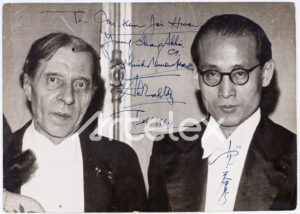Ahn Eak-tai (December 5, 1906 – September 16, 1965)** was a South Korean-born composer, cellist, trumpeter, violinist, and conductor who later resided in Spain. He is best known for composing Aegukga, the national anthem of South Korea, and his notable work includes the Korean Fantasy. His pen name was **San-nam (山南).
Ahn Eak-tai was born in Pyongyang, Pyeongan Province, in 1906 and graduated from Pyongyang Jongno Elementary School and Soongsil High School. He then studied in Japan at Tokyo’s Seisoku Middle School, specializing in music, and graduated from Kunitachi College of Music in 1930. Afterward, he went to the United States, where he studied cello and conducting at the Cincinnati Conservatory of Music, Curtis Institute of Music, and Temple University’s Graduate School of Music.
In 1936, Ahn visited Europe for the first time, where he interacted with musicians such as Paul Hindemith and Felix Weingartner, beginning his musical career. He conducted in Germany, Italy, Yugoslavia, Bulgaria, and other countries. However, in 1941, Ahn conducted Japanese imperial court music and performed Japan’s national anthem, Kimigayo, which led to controversy regarding his pro-Japanese activities.
In 1944, as World War II worsened, Ahn relocated to Spain, where he settled in Mallorca and became the chief conductor of the Mallorca Symphony Orchestra. He also conducted in Switzerland, Mexico, and Guatemala, and visited Korea for the first time after the establishment of the Republic of Korea in 1955. Ahn passed away in Barcelona in 1965, and in 1977, his remains were returned to South Korea and interred at the Seoul National Cemetery.
Despite controversies surrounding his pro-Japanese activities, Ahn Eak-tai remains an important figure in South Korea’s musical history.
Ahn wrote a brief message and signed a photo taken with Alfred Cortot, a Swiss musician.

